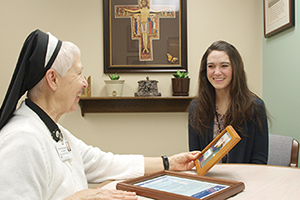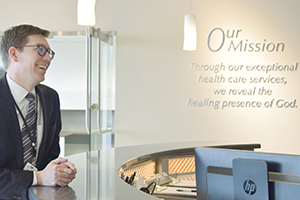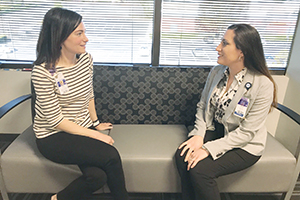By JULIE MINDA
There's a fresh face in the mission office at Holy Family Memorial hospital in Manitowoc, Wis., as a result of Franciscan Sisters of Christian Charity Sponsored Ministries' effort to build up the U.S. health ministry's mission executive pipeline.
Since August, 24-year-old mission intern Emily Guillemette has been assisting the facility's mission director of eight years, Sr. Rochelle Kerkhof, OSF, and learning the ropes as she goes. Guillemette helps orient new employees to the FSCCM system, makes presentations about the sisters' heritage, creates prayer resources, runs a program to celebrate employees living out the system's mission and contributes to mission integration and community benefit reports.

Sr. Rochelle Kerkhof, OSF, director of mission for Holy Family Memorial, discusses ideas for an employee recognition award with Emily Guillemette, the hospital's mission intern. The facility is in Manitowoc, Wis.
The experience has given Guillemette, who has bachelor and master's degrees in Catholic studies, a taste for mission work at a Catholic hospital. "I love coming to work — there's always something different that I'm working on," she said. "I feel that God is calling me" to some type of mission work.
Scott McConnaha, vice president of mission and strategy for Manitowoc-based FSCCM, said in creating the yearlong, paid internship, FSCCM was aiming to "do our part for the larger ministry. I know from past conversations with other mission leaders that one of the things that is always a challenge is finding good, reliable young people" for mission positions, McConnaha said.
Other ministry providers are being intentional in promoting health care mission careers too. And there is some urgency to the effort. CHA surveyed its members in 2013 and determined that only 16 percent of mission leaders were under age 50. That same year, only 35 percent of ministry systems had formal succession plans in place for the mission leader role.
CHA is convening a task force to fully assess the forces behind looming shortages in mission and other critical roles, determine how the ministry is addressing the situation and devise how CHA can support those efforts.
'Crisis'-level shortage
Catholic health providers already are challenged to find qualified candidates with the right mix of experience and education to fill mission leader roles, said John Wallenhorst, senior vice president of mission and ethics for Bon Secours Health System of Marriottsville, Md. (See below.)

Michael Miller recently joined St. Louis-based SSM Health as system vice president of mission and ethics. He started his career in mission as a fellow within the Livonia, Mich.-based Trinity Health system about a decade ago, going on to hold positions of increasing responsibility in mission departments at several Trinity facilities.
Timothy Glover, senior vice president for mission integration for St. Louis' Ascension Healthcare, said, when seeking mission leader candidates, ministry providers are looking for someone who has "solid theological grounding and training, coupled with executive presence and leadership capability, coupled with a rich interior life and spirituality — all wrapped up with maturity, wholeness and integration.
"So, there's a miracle" to find someone who fits the bill, he laughed.
There is no relief in sight. "When one considers that half the mission executives will retire in the next decade — in most industries, that is considered a crisis," Philip Boyle told Catholic Health World. He is senior vice president of mission integration for Livonia, Mich.-based Trinity Health.
Many Catholic health organizations don't have a deep bench of younger generation workers to fill the roles, said Gerard F. Heeley, senior vice president and chief mission integration and leadership formation officer for Irving, Texas-based CHRISTUS Health. He said this has to do in part with the lack of awareness by university students in mission-related study that health care mission positions even exist.
For young people aspiring to a career in ministry mission work, there is not always an obvious career path to those jobs, said Brian Smith, CHA senior director of mission integration and leadership formation. Others may discount mission as a health career choice early on because salaries are not always on par with other leadership positions.
Most large ministry systems position their top mission executive at the senior vice president or c-suite level; and those leaders normally have staffs to support them. Increasingly, systems are employing vice president-level mission leaders at the regional level, with facility mission directors reporting to them.
Irons in the fire
Sites within the 153-hospital Ascension have been collaborating with higher learning institutions in their regions to develop curriculum that exposes students to mission positions. Similarly, McConnaha, of the three-hospital FSCCM, has been contacting universities and colleges in the region to discuss how to promote the mission role with students. He's spoken multiple times at the local liberal arts college.

Jessica Roach, at right, director of mission for Bon Secours St. Francis, meets with Katie Phillips, the facility's event coordinator for marketing and public relations. Roach was Bon Secours Health System's first mission fellow. Bon Secours St. Francis, in Greenville, S.C., hired Roach directly from the fellowship.
Ascension and the 40-hospital CHRISTUS shared a booth at the biennial Fellowship of Catholic University Students conference in Chicago in January. Hundreds of students visited the booth. Twenty-nine expressed interest in learning more about the vocation of mission integration and the systems intend to follow-up with them.
CHRISTUS' summer internship program enrolls several dozen college and university students annually — several of them for mission tracks. The mission interns learn about mission work at the system and facility levels and complete projects that benefit CHRISTUS mission departments.
CHRISTUS, Bon Secours and Trinity Health have created paid fellowship programs that allow postgraduate students, graduates and/or early-career executives intense exposure to their systems and to the mission function. CHRISTUS' 10-month Mission Leader Development Program is an orientation and onboarding program that enables newly hired vice presidents or directors of mission as well as CHRISTUS executives interested in becoming a mission executive to build up their theological training and mission experience so they can excel in their existing role in mission leadership or prepare to move into such a role.
The 20-hospital Bon Secours rolled out its two-year fellowship program two years ago to expose prospective mission executives — both internal and external prospects — to all the dimensions of the role at both the system and facility level. The first fellow already has been hired by a Bon Secours facility. Trinity, a 94-hospital system, fills one slot at most annually in its yearlong mission fellowship program with a postgraduate student, normally one who studied theology or ethics. D'Anne Carpenter, Trinity director of talent development, said the fellow interacts with the system's top leadership, and works alongside mission leaders at the system and facility level.
Advancing vocations
Ascension's pipeline buildup is tied in with other strategic system initiatives, and the system nurtures mission vocations from within its employee ranks, said Glover. Ascension's robust formation program has stirred an interest in mission work in employees in a wide variety of roles throughout the system. Glover said Ascension has created formal programming to encourage such interest and help employees who want to transition to mission leadership to build up the necessary credentials to do so.
Ascension is piloting a program to partner such associates with a mission leader, for formal mentoring and career-building. McConnaha similarly has kept an eye out for FSCCM employees with a "heart and mind" for mission work, he said, and has encouraged facility mission leaders to do the same.
Ascension's Glover and Bon Secours' Wallenhorst said the evolution of their systems has resulted in the creation of new roles in the mission function — roles suitable for younger executives and that can prepare them for higher-level mission leadership. Both said their systems are now organized on a more regional basis than on a facility basis, and with less focus on hospitals and more on the full care continuum. This has allowed for the creation of more specialized mission roles that support regional mission leaders. For instance, roles specializing in formation or community benefit have been established in regions and can be a career path to the mission leader position.
The evolution of the health care delivery system will continue to shape mission roles over time, and will present new recruiting challenges, said Glover. But, the challenges also represent "a great opportunity of imagination," he said.
Wallenhorst agreed, "Part of the challenge is also part of the excitement — we have a great story to tell about Catholic health care mission leadership."
|
Systems help executives develop mission competencies
It is usual for ministry systems to financially support prospective mission leaders' education and training to fill in gaps in their background.
Nearly always a master's degree in theology, ethics or a similar field of study is required for director-level positions and above in mission leadership. A doctor of philosophy degree is common — but is not usually required — for senior vice president mission executives.
CHA offers an assessment tool at chausa.org/mission/overview that describes competencies that mission executives must have. These include: organizational management skills, leadership, theological grounding, spirituality, ethical grounding and positive character.
|
Copyright © 2018 by the Catholic Health Association
of the United States
For reprint permission, contact Betty Crosby or call (314) 253-3490.